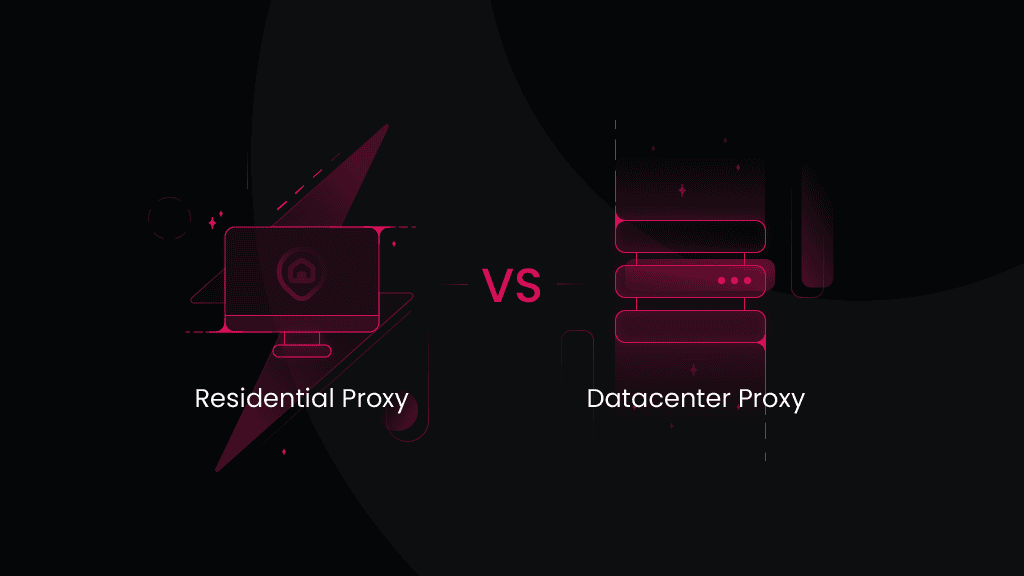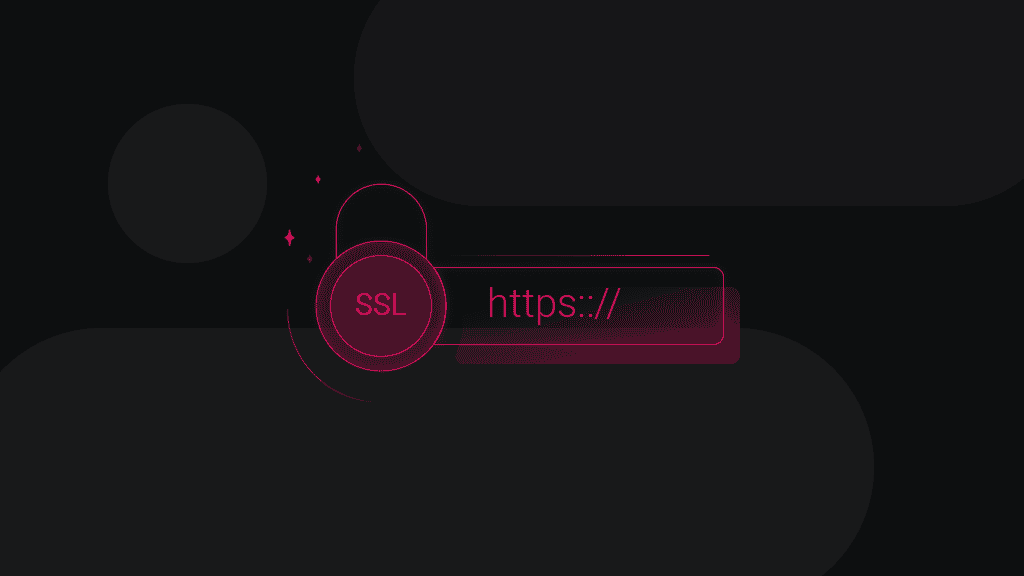Residential vs Datacenter Proxies: Which Should You Choose?
At first glance, residential and datacenter proxies may seem the same. Both types act as intermediaries that hide your IP address, allowing you to access restricted websites and geo-blocked content. However, there are some important differences between residential and datacenter proxies that you should know before making a decision. We’re happy to walk you through the differences so you can choose what's right for you.

Vilius Sakutis
Dec 19, 2023
7 min read

What are datacenter proxies
Datacenter proxies IPs are sourced from data centers with unique IPs that act as an intermediary between you and the target website, independent of your internet connection or Internet Service Provider (ISP). This independence makes it easy to hide your IP address without being tied to a specific location, therefore, datacenter proxies are most commonly used for web scraping, SEO monitoring, social media management, market research, and more. You can choose between shared or dedicated datacenter proxies.
Shared datacenter proxies
Shared datacenter proxies are like taking a bus to your destination. Multiple users access these proxies simultaneously, making them cost-effective. They’re great for market and SEO research, ad verification, entertainment, and browsing. But remember, sharing a proxy can mean slower speeds and a higher chance of getting blocked if another user misbehaves.
Dedicated datacenter proxies
Think of dedicated datacenter proxies as driving in your personal car. Only one person uses them at a time, offering faster, more reliable connections. Ideal for web scraping, multi-accounting, cyber and brand security, or smooth online gaming, these proxies provide stability and security. They cost more, but they’re worth every penny for those needing consistent performance.
What are residential proxies
Residential proxies provide IPs from Internet Service Providers (ISPs), sourced from regular users' mobile devices, desktops, and other household devices connected to Wi-Fi networks across various countries and cities. These proxies allow you to set a specific location, making it appear as though you're a genuine user on the internet while keeping your real IP address hidden. Residential proxies are ideal for tasks that require authenticity. They’re commonly used for privacy protection, web scraping, eCommerce testing, and SEO monitoring and research, as they’re the least likely to be blocked.
ISP proxies
ISP proxies are a specific type of proxy directly provided by Internet Service Providers (ISPs) and hosted on servers at data centers. Unlike residential proxies, ISP proxies aren’t sourced from user devices. Instead, they’re allocated by the ISPs themselves. This proxy is best suited for tasks that require both the authenticity of a residential IP and the speed and reliability of a datacenter proxy, like managing multiple social media accounts or high-speed data scraping.
Mobile proxies
Mobile proxies use IPs assigned by mobile carriers and sourced from mobile devices like smartphones and tablets using 3G, 4G, or 5G cellular networks. They excel in activities needing high trust and anonymity, as they rarely get blocked and rotate within network and provider pools. Mobile proxies also enable access to mobile-specific data and offer faster internet speeds.
Comparing proxy types
Now that we've covered the main features of datacenter and residential proxies, let's take a closer look at what you've been waiting for – the key differences.
Datacenter vs. residential proxies
Datacenter proxies are typically cheaper, faster, and more accessible than residential proxies because datacenter proxies aren't limited by ISP constraints. However, with residential proxies, you get other benefits. It’s easier to prevent geo-blocking, your activities appear more legitimate, anonymous, and more difficult to block because residential proxies use real IP addresses from actual devices.
Type
Residential proxies
Datacenter proxies
IP origin
ISPs (Internet Service Providers)
Data centers & cloud servers
Uniqueness
High, resemble actual users
Low, may be identified as computer-generated
Ban risk
Low due to unique IPs
Higher, with subnet bans affecting many IPs
Response time
Moderate to fast
Fast
Geo-targeting
International access with a variety of regional IPs
Limited to the proxy server’s geographic location
Use cases
- Web scraping
- Multi-accounting
- Ad verification
- Travel fare aggregation
- Cybersecurity
- eCommerce research
- SEO monitoring
- Scraping simple websites
- Accessing geo-restricted content
- SEO monitoring
- Price monitoring
- Website & application testing
Pricing
Best value with shared proxies; higher cost for dedicated IPs
Cost-effective; usually cheaper than alternatives
Residential proxies vs. dedicated datacenter proxies
Residential proxies typically operate on a rotating IP system, offering users IP addresses that can change every session or remain static for up to several minutes. Dedicated datacenter proxies, on the other hand, assign a unique IP to each user, ensuring exclusivity and a consistent online presence, which is important for tasks that demand a stable, trustworthy IP identity. Regarding pricing, dedicated datacenter proxies often adopt a per-IP pricing model, as opposed to the traffic-based pricing commonly associated with residential proxies.
ISP vs. datacenter proxies
ISP proxies represent a hybrid of functionality, merging the high anonymity of residential proxies with the enhanced speed and stability characteristic of datacenter proxies. This blend makes ISP proxies an optimal choice for users who require the best features of both residential and datacenter proxies without compromising on quality or performance.
Mobile vs. datacenter proxies
Mobile proxies offer a higher level of authenticity by rotating IPs typically assigned to mobile devices, which can effectively evade detection algorithms. In contrast, datacenter proxies offer stability and speed but lack the inherent trustworthiness of mobile IPs and are more easily identifiable as proxies. While datacenter proxies are more cost-efficient, mobile proxies offer the unique advantage of real-world user simulation, making them a more suitable choice for operations that require moving under the radar of web security measures.
Choosing the right proxy for your needs
When choosing between datacenter and residential proxies, it's important to weigh their advantages and disadvantages for your specific use case. For example, do you need speed, stability, and cost-efficiency? Or are anonymity, various geo-targeting options, and avoiding anti-bot systems and IP bans more important to you?
Datacenter proxies are known for their quick speed and reliability, but they're more likely to get blocked due to their less diverse IP range. Also, the rapid response time of datacenter proxies can lead the user to be flagged for non-human behavior. Residential proxies, on the other hand, offer unique IPs that mimic real user behavior, making them less prone to bans and better for tasks requiring a natural-looking online presence.
Our users who need to efficiently gather and analyze competitor data or create multiple accounts for performance or app testing often find that datacenter solutions work best for their needs. However, for bypassing geo-restrictions, avoiding anti-bot measures, multiple account management, AI training, web scraping, residential proxies are the ideal solution.
In a nutshell
Both residential and datacenter proxies provide essential tools for secure and efficient web navigation, suiting various online needs. Residential proxies, with their rotating IP addresses, excel in anonymity and mimic real-user behavior, while datacenter proxies offer stable, unique IPs known for speed and efficiency in data-heavy tasks.
At Decodo, we have every sort of proxy you may need. We take pride in our 115M+ residential proxies from 195+ locations with the fastest response time (<0.5s), one of the highest success rates (99.68%) in the market, and a great entry point with Pay As You Go.
We also have 100K+ shared datacenter proxies with worldwide locations and flexible payment options (Pay per GB or IP) as well as 400K+ dedicated datacenter proxies from the US. Furthermore, you can rest assured of the quality of our 10M+ mobile proxies and shared or dedicated ISP proxies.
Still unsure? We’re now offering a free 3-day trial for all our proxy solutions! Try both and see which one works best for you.
And if you ever need someone to talk to about choosing the right proxies, don’t hesitate to contact our 24/7 support team via LiveChat!
About the author

Vilius Sakutis
Head of Partnerships
Vilius leads performance marketing initiatives with expertize rooted in affiliates and SaaS marketing strategies. Armed with a Master's in International Marketing and Management, he combines academic insight with hands-on experience to drive measurable results in digital marketing campaigns.
Connect with Vilius via LinkedIn
All information on Decodo Blog is provided on an as is basis and for informational purposes only. We make no representation and disclaim all liability with respect to your use of any information contained on Decodo Blog or any third-party websites that may belinked therein.



